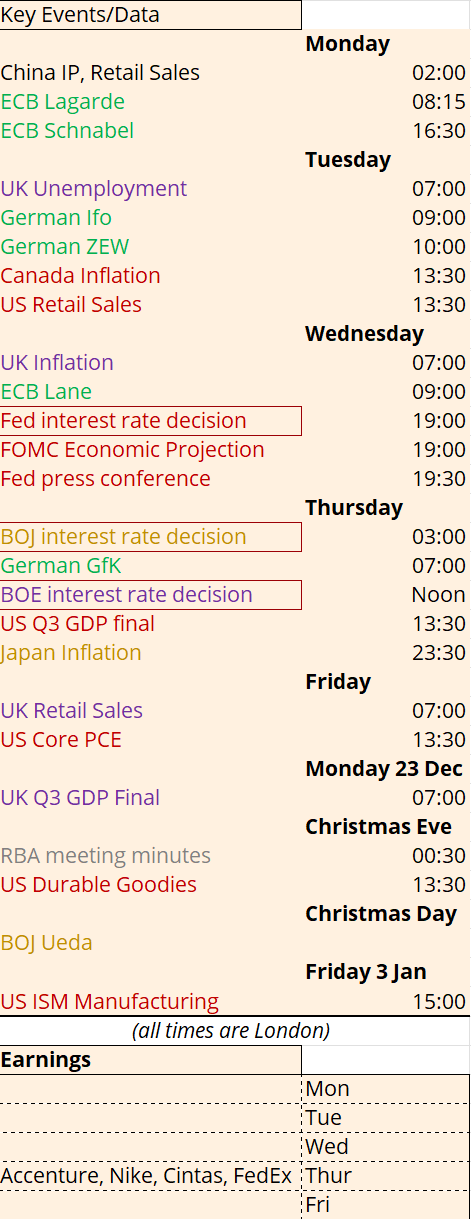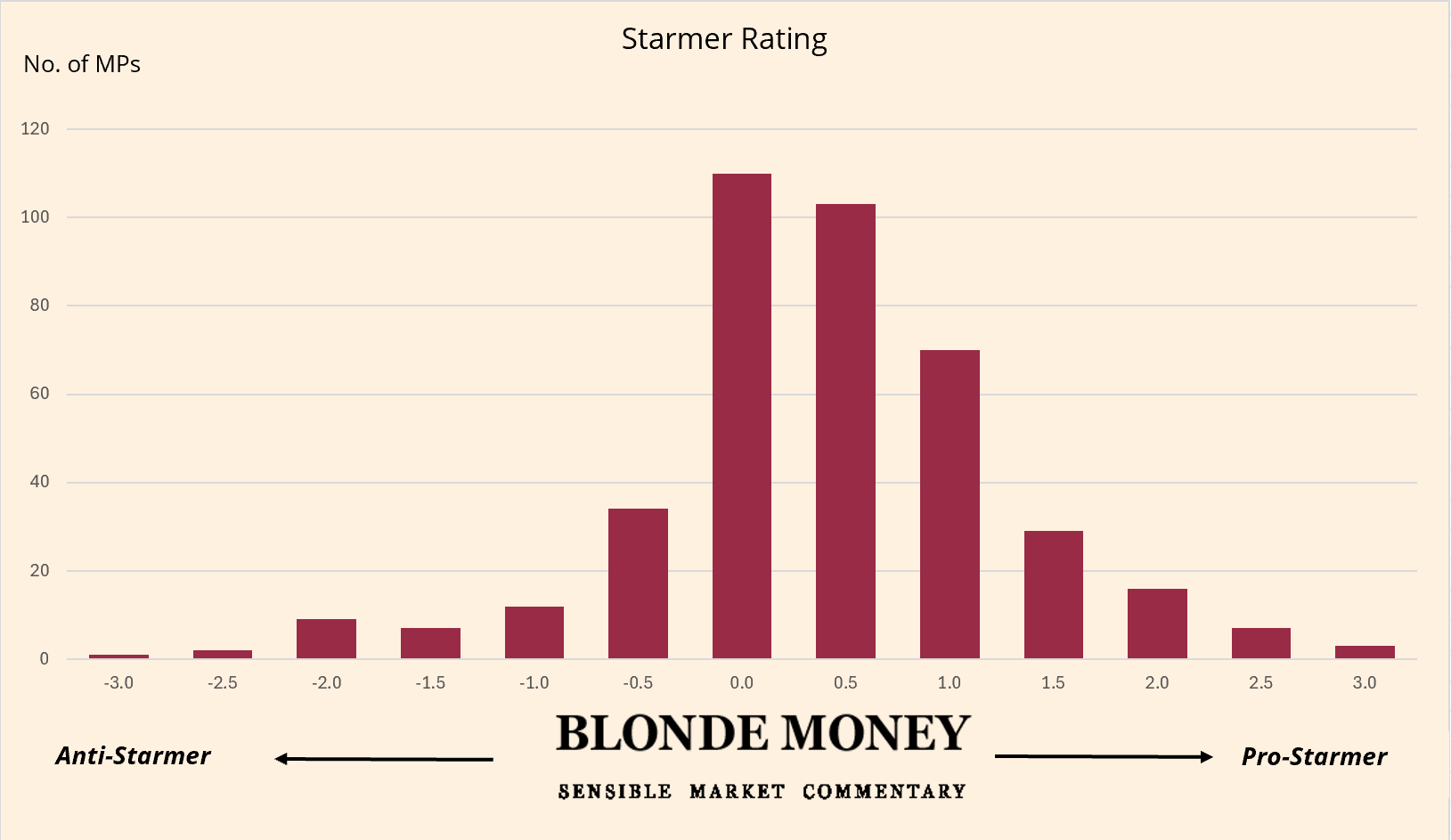
The Christmas Weeks That Will Be

1. The UK
The MPC will vote for an interest rate cut at the BOE meeting on Thursday. The inflation number released the day before on Wednesday is of less relevance given the steady drumbeat of disappointing growth data. (There is also the unemployment data released on Tuesday but with this data now wildly unfit for purpose it can largely be ignored).
The BOE can’t afford to wait. The negative reading for GDP in October raises the spectre of recession which is politically pernicious even if economically insignificant. Whether growth is +0.1% or -0.1%, it’s basically still zero, but recession headlines hold more eyeballs and are more harmful for the government. Rachel Reeves will argue that all of this is in the rear view mirror, economic inheritance / fiscal black hole etc, and that she has now solved this with her budget that took place on the penultimate day of that month. This is a big gamble. Her Budget increased borrowing in order to spend on public sector investment whilst slapping tax rises and increasing labour costs on business. She will have a problem of timing, if nothing else, with businesses taking immediate decisions on hiring (UK job vacancies falling at the fastest rate since the pandemic) whilst investment takes time to come through. Even if there were plenty of shovels in the ground, the nature of public sector investment means it moves more slowly than in the private sector (it’s not just about announcing an 82 page National Planning Policy Framework).
Taking such a gamble just as the US elects an ideologically opposing government and the core of Europe loses government altogether has meant that panic is starting to set in. The much-delayed and much-promised Departmental Spending Review has reportedly been pushed back from ‘Spring’ to June. The Treasury chief secretary Darren Jones has said this is because they are conducting a “line by line” review. Not to make the numbers add up, as such, but to rein in ministers: ‘There’s a dashboard that starts flashing at them if they type in too much money for their budget. It tells them that they’ve blown their budget and also how much we would have to put up taxes to pay for the extra spending’. In short: do not blow up Rachel’s budget. He then put out a video appeal to the country, telling voters he wanted them to be part of the process. Quite how your Uncle Dave can determine the budget for potholes, we don’t know, but now at least he has been asked.
The review was launched onto an unsuspecting public with articles such as this in the Sun which quoted a proud Chancellor saying she was taking an ‘iron fist’ against waste. The sub-headline noted ‘Ministers have already scrapped a £6.5 million programme involving placing social workers in schools as it was not cost-effective’. Talking about a saving of £6.5 million in the context of £1.3 trillion of spending demonstrates we are now in straw-clutching territory. The gambler has doubled down, used credit cards to borrow on credit cards and is now desperately praying nobody will notice their chips are all on red 36. The UK retail sales number on Friday and final reading of Q3 GDP on Monday 23rd December are unlikely to make this a restful festive season at Number 11.
2. The US
The Fed will cut on Wednesday but signal they’re done, for now. They won’t even continue very much next year, given that the first tariffs will be signed by executive order as soon as Trump gets a pen in his hand on 20th January 2025. The dot plot will become less reliable than ever, with Fed members understandably politically divided on how this, combined with immigration deportations and ‘government efficiency’ spending cuts will impact the economy. The dot plot will look hawkish, particularly the dot for the long run interest rate, which only needs one FOMC member to drift their estimate upward to drag the median dot up too. Powell will therefore use the press conference to buy as much optionality as possible. He wants to be reactive, not proactive, in the face of DJT 2.0.
3. The EU
Neither of the two core Eurozone countries currently have a functioning government and nor will they for some time. Macron’s latest pick for PM, Francois Bayrou, is only going to be able to keep the lights on and remains at the mercy of Marine Le Pen (amongst others). By choosing someone so close to his own project, Macron is raising the stakes over his own future. He will be unable to spin the prime ministerial wheel one more time and will then face either constitutional change to break the deadlock (by removing the 12 month blackout on assembly elections) or announcing his own resignation (which will usher in a Presidential election within a month). One thing is clear: this appointment does not solve France’s problems. In fact, quite the reverse. The ratings agencies have belatedly recognised the impact of this on France’s appalling debt/deficit dynamics, with Moody’s finally downgrading France’s credit rating, because ‘France’s public finances will be substantially weakened by the country’s political fragmentation which, for the foreseeable future, will constrain the scope and magnitude of measures that could narrow large deficits’.
Germany is going through the constitutional motions to pave the way for a 23rd February 2025 election. Whilst that provides some certainty regarding the vote, it does not provide comfort over the constellation of the next government. Coalition building has become harder as the electorate has fragmented – and maintaining such a coalition becomes even more difficult. The Eurozone is headless for quite some time to come.
This leaves the ECB the opportunity to step into the vacuum. We now know that a 50bp cut was discussed at the latest meeting and that the doves at the ECB are keen to get rates into stimulative territory below neutral. Lagarde and Schnabel gives speeches on Monday whilst Lane makes one to MNI on Wednesday. If Schnabel gives in to a more dovish tone then the path forward to more aggressive ECB rate cuts is clear. They’re almost certainly astonished they haven’t had dysfunction in French government bonds to deal with – yet. They will be ready when the time comes.
4. The BOJ
Politics has also played its part for the BOJ. With the LDP losing its majority there has been protracted budget negotiations, not only with their junior coalition partner Komeito but also the opposition DPP. They finally agreed a deal on 11th December by accepting two key DPP proposals (raising minimum taxable income and abolishing the extra gasoline tax rate). This level of consensus building is almost unheard of in a democracy that has effectively been a one-party state for several decades. Hence where Governor Ueda had been developing a gradually more hawkish line in an attempt to get interest rates meaningfully above zero, the woeful political picture has stayed his hand. Sources have been merrily leaking left right and centre (or, at least, to Reuters) about how the BOJ will leave rates unchanged on Thursday. And it’s not just the BOJ leaking. A ‘senior government official’ couldn’t have been clearer with their response to the question of whether the BOJ should hike this week: “It’s desirable for the BOJ to hold off on raising rates until the economy recovers a bit more”. This chimes with DPP concerns about the Bank raising rates before the annual wage negotiation rounds are concluded in March.
There was also the unusually specific leak that if the FOMC meeting the night before should see the Yen weaken, then the BOJ would hike after all, which just shows you how much they are currently at the mercy of events. Governor Ueda will seek to wrest back control with a speech on, yes you’ve guessed it, Christmas Day when he will speak to the influential Meeting of Councillors of Keidanren. He used the same date for the same audience last year and in his Christmas Day 2023 speech laid the groundwork for moving Japan out of negative interest rates just a few months later. Whatever the political constraints this year he will want to keep the positive interest rate train moving onwards and upwards.
….And finally, from all of the BlondeMoney Team, we wish you a very Merry Christmas and a Happy New Year! Last year we predicted the UK election would be sooner than you thought, that Trump would win and that Germany would go to early elections. Our outlook for 2025 will be along before the mince pies and sherry have settled in Santa’s stout stomach. Have a good rest!! We are all going to need it….



